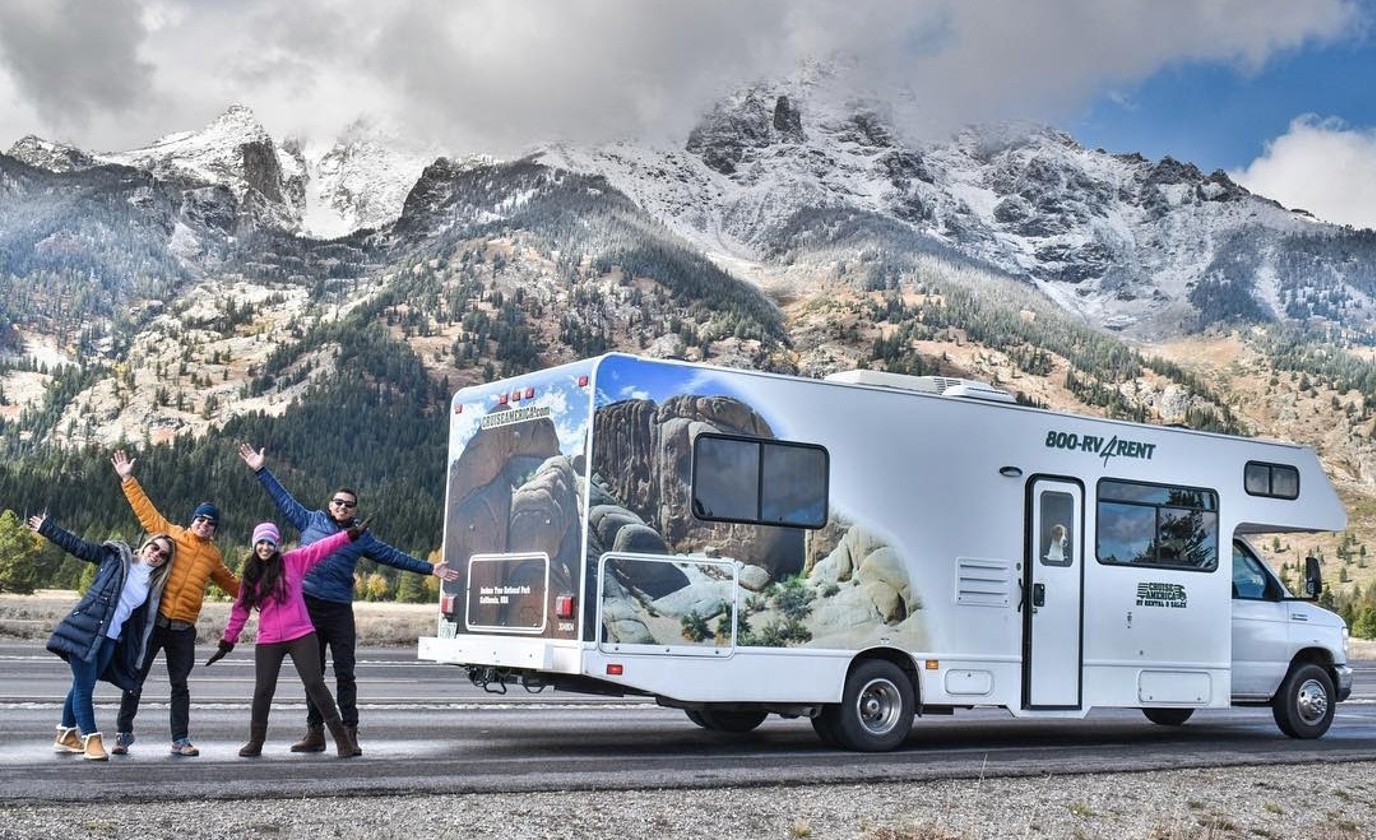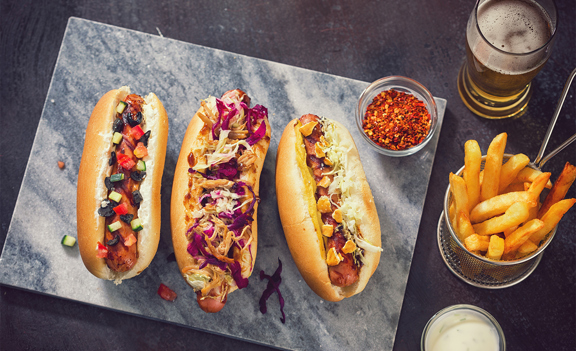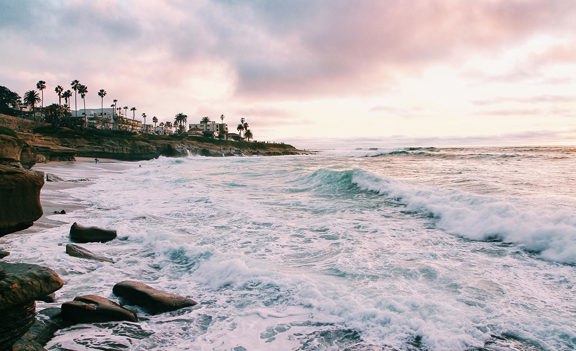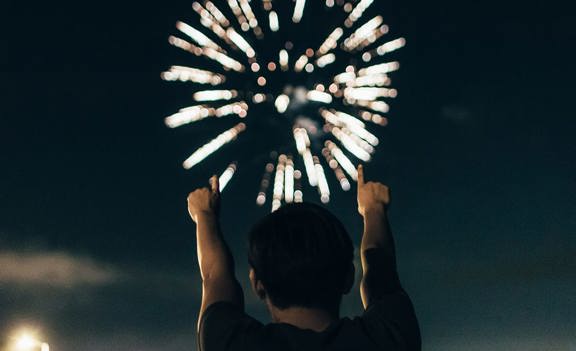
How to Stay Safe When Camping: A Traveler’s Guide
- RV Lifestyle
Camping can be one of the best escapes from the monotony of everyday life. Away from all of the extra stuff that takes our time and clutters our minds at home, campers can find peace and adventure in the great outdoors. But there are a number of risks and possible dangers that can arise when you’re camping solo or even with fellow campers. Whenever you get ready to take that first or next camping trip, make safety a priority by following these tips.
How to Stay Safe When Camping
Most camping experiences are full of fun, laughter, and adventure. Ensure you have a great experience by taking the necessary precautions to stay safe when camping.
Risks at the Campsite
Start considering the safety risks before you even get to the campsite. Even if you’re not booking a designated campsite at a state or national park, you can make sure that you are considering your possible environment long before you arrive. Depending on whether you find yourself in the desert, forest, mountain, or near an ocean will change the type of camping gear and preparation you will need to ensure a safe camping trip. Do your research and be prepared to handle the unique challenges of camping in any climate.
When it comes to pitching your tent or parking your RV, inspect your chosen site for any potential hazards. Parking directly under a tree could lead to falling branches in strong winds or storms. Setting up at the bottom of a hill or in a dry creek bed could lead to sudden flooding that could prove dangerous. Check for clear signs of wildlife as well. You won’t want to set up your home away from home only to find it infested with a family of snakes, rodents, or worse. Set yourself up for success from the beginning stages of planning your trip so that you won’t have to scramble later.
Weather
Check the weather forecast extensively before leaving for your camping trip. The best way to keep safe from weather-related accidents is to come prepared for whatever Mother Nature has in store. For areas with wide temperature swings, such as the desert, be sure to have warm clothes and extra blankets at night paired with light and breathable clothing for the hottest part of the day. If it's the rainy season, bring waterproof layers and plenty of extra warm base layers that can keep you as dry as possible. Don’t get caught at the mercy of the weather.
Avoiding temperature-related illnesses can also be key. Heat stroke is a real possibility in hot, sunny climates, so be sure to monitor for symptoms. It doesn't take long for hypothermia to set in in cold conditions. If you can afford to carry extra weight, bring extra gear to handle any days when the weather person may have made a mistake so you are ready for anything.
The sun can be its own danger when you are living primarily outside. Protect your skin from the sun as much as possible. You can cover up with clothing that protects your body and wear a hat that shades your face, ears, and neck. Don’t forget to reapply sunscreen throughout the day on any parts that remain uncovered. And stick to the shade if there is any.
Food and Water
When camping in the backcountry or the front country, it’s vital to have proper food and water safety techniques. When it comes to food, you can make your dry goods last longer and stay pest-free by keeping them in air-tight containers that are well-sealed. Your perishable foods and raw goods will need to be kept cold to prevent them from spoiling.
If you don’t have a constantly running refrigerator on board, try to minimize the amount of raw food you bring. For raw food, you’ll need at least one cooler loaded with ice to keep everything at a safe temperature until you cook it. The easiest way to manage coolers is to have one cooler for drinks and a separate cooler for food. This will minimize the amount of time you need to open your food cooler, thus keeping everything inside less exposed to the warmer outside air.
Water is key to our survival, and we cannot go more than a few days without it. Staying hydrated is crucial, and you must remember to drink plenty of water. Only drink clean water when you’re camping. If you can’t bring in enough water to last for your entire trip, be sure to purify any water you gather before you drink it. You can boil water at a rolling boil for 1-3 minutes or use a water purification tablet or drop to purify. Remember that you should also use purified water for washing your food and dishes to avoid waterborne illnesses.
For those in an RV or car who can bring more than what you have to carry, the best practice is to have at least a 3-5 days supply of bottled water and non-perishable foods to last you just in case. Continuously check expiration dates to make sure that your emergency supply of food and water doesn’t expire.
Fire Safety
Fire is beautiful and captivating but can be the site of many campground accidents. Fire safety is crucial for every camper. A fire may not always be allowed at every campsite, but when they are, it’s important to keep them small and most vitally, under control. Keep a bucket of water, sand, or dirt nearby so you can quickly extinguish a fire that starts to spread. You can help keep the fire under control by making sure it is as small as possible to handle your needs.
Dry, windy conditions can be the enemy of a contained fire. If the weather doesn’t cooperate, don’t try to light a fire anyway and instead use a gas cooking stove or lantern for your cooking and lighting needs. Use the designated fire ring at your campsite if there is one provided. The fire should always be at least 15 feet away from your tent, RV, and also any plants or trees.
Once lit, make sure an adult is always present and the fire is never left unattended. Children and pets should be instructed to treat everything near the fire as if it is already hot and refrain from poking or throwing things into the fire.
To safely end time near the campfire, it’s important to make sure the fire goes out completely. Ideally, let the fire burn all the way down to ashes before going to sleep. If you need to extinguish the fire suddenly or quickly, use the water or smothering material on-hand to put out all of the remaining embers whether they are actively glowing or not.
Tell A Friend
While it can be nice to just escape to the wilderness, let someone staying home know exactly your plans. Having a buddy at home who knows where you plan to be and for how long is a crucial safety measure. If you can check in regularly, that’s great. But if you are away from cell reception, this person can be the first to alert someone if you aren’t back on time for any reason.
Do not share this information publicly or post about your specific location on social media. That could draw unwanted attention to you. Just one or two people you trust can provide the peace of mind that someone is expecting you. Carry identification on you when you leave the campground and also your emergency contact information. In case of accident, this will let someone know about any pre-existing medical issues you have and who to contact first if you are discovered and unable to communicate this information yourself.
Don’t Get Lost
Easier said than done for some, but it’s important to know your whereabouts to prevent a situation that turns dangerous very quickly. Bring maps and possibly GPS, so you know the area and how to get back to your campsite after excursions. For hikers, stick to marked trails and do not leave the trail to make it harder for you to get lost. You can always turn around and come back the way you came.
Before leaving the campsite, make a plan in case anyone gets separated from the group, so you know where to reconvene with everyone–especially if cell service is spotty or non-existent. Every person you’re traveling with should know the physical address of the campsite, including the name of the campgrounds, site number, and full street, city, state, and zip code. If you aren’t staying at a designated campground, learn the GPS coordinates for where you are if possible or at the very least know the name of the road, any identifying features of your site, and the mile marker closest to where you are. If someone needs to get emergency responders to you, the more information you have to guide them the better!
Evacuation Plan
In case of emergency, make sure you have an evacuation plan from your campground. Will you be able to hop in a car if you need to leave immediately? Where will you meet up if something has rendered your vehicle unable to move? There’s no telling what could cause you to need to leave right away, but don’t ignore any unsafe feelings or severe weather warnings.
First Aid Gear
A first-aid kit is required gear for any camping trip. You may need to change the contents slightly based on the climate and environment in which you camp, but it should always contain basic items such as:
-
Wound coverings such as adhesive bandages and gauze
-
Antibacterial ointment
-
Antiseptic wipes
-
An epipen if anyone has allergies, as well as anti-histamine tablets
-
Blister treatment
-
Fine-point tweezers
-
Pain-relief medication
This is just the beginning. You can always add additional medications, more comprehensive wound care items, and further supplies to protect yourself and your companions.
Wildlife Safety
When many people think about dangers while camping, the first thing that comes to mind is wild animals. Indeed, if you’re in an area with large predators such as bears, cougars, or wolves, it’s important to take precautions. Have bear spray if necessary, and make sure to properly store food and other items with substantial smell in a bear-proof container and do not keep them in a tent with you.
Definitely do not feed the animals as creatures that get habituated to human contact can become a major problem. No one likes a campground infested with racoons because they’re used to human food and their presence. Large animals may need to be euthanized as their willingness to come nearer to humans makes them a big threat.
Predators aren’t the only danger when camping. Treat all wildlife with respect and care. It’s often the littlest creatures that you will need to worry about most. Snakes, mosquitos, ticks, and other biting insects can all cause severe injury or disease, even in their small packages. Protect yourself by keeping a distance from wildlife and wearing insect repellent to ward off the biters.
Plants
Do a little research on the area you are camping in to check for any plants that absolutely must be avoided. Poison ivy and poison oak are two big ones that you are likely to encounter in the wilderness. Being able to identify them can save you tons of itching and a seriously uncomfortable rash.
Do not ever eat anything you cannot confidently and perfectly. Avoid eating anything from trees and bushes. No matter how appetizing they may look, do not eat berries or mushrooms that you come across while camping.
Stay Alert
Staying safe while camping mostly comes to preparing in advance for minor mishaps. Know and respect your physical limits to reduce the number of accidents that happen at camp. And whether you’re at the site or busy doing something else, stay alert to the potential dangers around you.
With these tips, you can minimize the most common risks associated with camping and exploring in the wilderness and at our parks.





